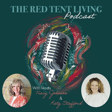
The Journey of Advent: Conceiving of Hope in the Darkness with Katy Stafford and Tracy Johnson
Welcome to the first week of Advent. This is a season of waiting and anticipation: a season of leaning into the hope that God is with us and God comes to us again and again. In the coming month, Katy and Tracy reflect on what advent means for us today. Inspired by Mary's journey as a pregnant mother, we examine advent through the various stages of carrying and birthing life into the world (whether physcially or metaphorically). It's a series of Christmas conversations unlike any other, and we hope you'll join us on the journey! *Trigger Warning* This episode engages the biblical story of Bathsheba and her experience of sexual violence.
For journaling prompts that coincide with this episode and walk you through each day of advent, sign up at Red Tent Living.

